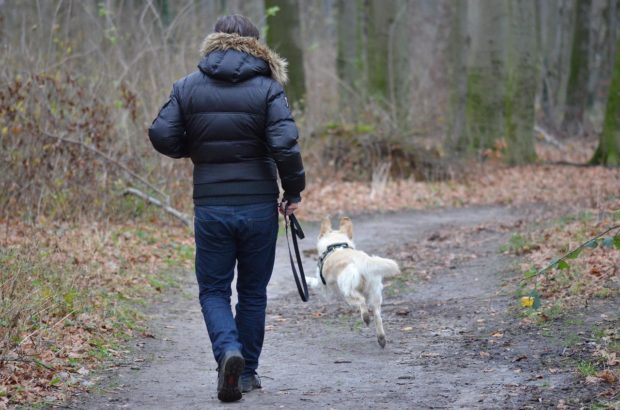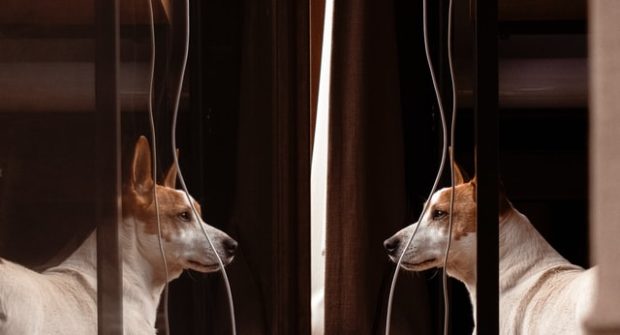Dogs are amazing. They’re smart, loyal, and curious—all the things we love about them. But those same traits that make dogs so wonderful can also get them into trouble. That’s why it’s important to keep track of your dog when you’re not home and to anticipate the ways they might try to get themselves in trouble.
The most obvious would be the neighbour’s cat, who has it out for your pooch and will stop at nothing to get revenge for the time you accidentally knocked over its bowl of kibble when you were trying to put away the groceries.
But there are other threats lurking around every corner, and they’re much more difficult to protect against because they can’t be seen—they’re just there, waiting for the perfect moment to strike.

Dogs are programmed to roam
Dogs are pack animals and therefore have an inherent desire to roam. They live in groups and need to feel part of the family, whether that’s a human one or another dog pack.
Because they are social animals, they enjoy spending time with their owners and other animals (including the cat!). They want attention from you all day long – it’s how they show love, affection and loyalty to you! When you go out for a walk together on your morning or evening routine, take your dog with you so that he/she can get some exercise while getting some quality time with his/her owner!

Electrical Cords
These can cause electrocution, especially if they’re chewed on. Make sure they’re out of reach when you can’t supervise your dog, or use an extension cord with a built-in circuit breaker that will shut off the electricity if your dog bites into it.

Dogs can ingest or choke on non-food items, too
In addition to eating the wrong food, dogs can also get into non-food items that pose a threat. Non-food items like:
- dangerous objects (scissors, knives, etc.)
- toxic substances (chemicals and cleaning supplies)
- poisonous substances (household plants)
- harmful or deadly things (toxic household cleaners or antifreeze)
Medicine could be dangerous to your dog
You may be familiar with the fact that dogs have different metabolisms than people, but what you might not know is that their bodies can’t process medicine in the same way. This means that if your dog gets into something they shouldn’t have, it could be dangerous for them to eat or drink it—even if they seem unharmed at first glance. They also aren’t built to handle the same dosage; therefore, even if there’s an over-the-counter option available, it’s probably best to check with your vet before giving any pills or liquid medications to your pup.
Pests
The most common pests that can enter your home and threaten your pet dog are ants and cockroaches. These bugs can carry diseases such as salmonella and E. coli, so it’s important to keep them from coming into contact with your pet dog. Ants can also cause allergies in dogs, so if this is an issue for you or your pup, take care not to leave food out where they might get it.
Inspect all cracks around doors, windows and vents regularly for signs of infestation such as webs or droppings which could indicate that pests are living inside your property. It is best to call a pest control service near your location and get rid of unwelcomed guests once and for all. Reach out to your smartphone and let Google find you the best pest control service near your location. As an example, if you live in Sydney, type experienced pest control from Sydney and choose from among the options Google offers you.
Pet poison hotlines are a good resource
If your dog has eaten something poisonous, the best first step is to call a veterinarian or animal poison control hotline.
Pet poison hotlines such as the ASPCA’s Animal Poison Control Center are staffed by veterinarians who can give you advice about how to help your pet and if it needs veterinary care immediately. Some veterinarians also have special training in diagnosing and treating animal poisoning cases, although many will refer you to an animal poison control centre for guidance before treating the patient directly.
If you can’t reach a veterinarian or pet poison control centre, call emergency centre immediately! The paramedics will be able to assess your dog and take whatever action they deem necessary based on their observations and symptoms described over the phone by yourself (or another family member).
A simple way to keep your dog safe is to childproof the house from their perspective
One of the easiest ways to keep your dog safe is to childproof the house from their perspective. This means making sure they can’t get into any dangerous places, and that you know where they are at all times. Dogs are curious and will explore, so it’s important that you watch them closely when they are around anything that might harm them or hurt someone else. They may also eat things like loose pills or plants if they find them accidentally, which could be fatal for both parties involved!
We have discussed the dangers of keeping your dog safe in this article, but there is one more thing we would like to make clear: it is not only dangerous items that can threaten your dog’s safety. Dogs are not children and you should never treat them as such. They are animals with their own instincts and needs, so let them be themselves! This means giving them space to roam freely if at all possible. Remember that dogs are programmed to roam because they need exercise for their muscles and bones as well as mental stimulation from exploring new areas or smelling things around them. Of course, sometimes thigs get out of control and despite your efforts your dog shows signs of health issues common to dogs. In such cases a vet check is mandatory.
